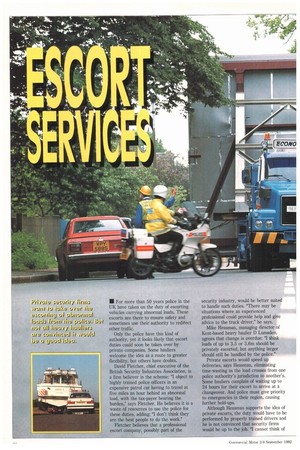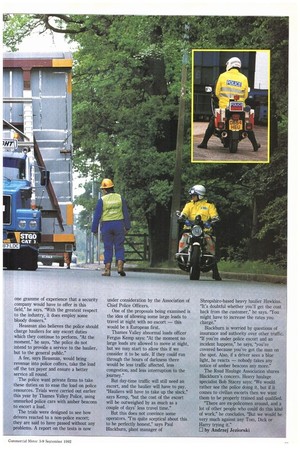riiiIJ uf ubnurniul luut15 E;yi nui turiiintd ifwuuld uuud
Page 40

Page 41

If you've noticed an error in this article please click here to report it so we can fix it.
• For more than 50 years police in the UK have taken on the duty of escorting vehicles carrying abnormal loads. These escorts are there to ensure safety and sometimes use their authority to reditect other traffic.
Only the police have this kind of authority, yet it looks likely that escort duties could soon be taken over by private companies. Some hauliers welcome the idea as a route to greater flexibility, but others have doubts.
David Fletcher, chief executive of the British Security Industries Association, is a firm believer in the scheme: "I object to highly trained police officers in an expensive patrol car having to travel at five miles an hour behind an abnormal load, with the tax-payer bearing the burden," says Fletcher. He believes it is a waste of resources to use the police for these duties, adding: "I don't think they are the best people to do the work."
Fletcher believes that a professional escort company, possibly part of the security industry, would be better suited to handle such duties. "There may be situations where an experienced professional could provide help and give advice to the truck driver," he says.
Mike Heasman, managing director of Kent-based heavy haulier D Lumsden, agrees that change is overdue: "I think loads of up to 3.5 or 3.6m should be privately escorted, but anything larger should still be handled by the police."
Private escorts would speed up deliveries, says Heasman, eliminating time-wasting as the load crosses from one police authority's jurisdiction to another's. Some hauliers complain of waiting up to 24 hours for their escort to arrive at a changeover. And police must give priority to emergencies in their region, causing further hold-ups.
Although Heasman supports the idea of private escorts, the duty would have to be performed by properly trained drivers and he is not convinced that security firms would be up to the job. "I cannot think of one gramme of experience that a security company would have to offer in this field," he says. "With the greatest respect to the industry, it does employ some bloody dossers."
Heasman also believes the police should charge hauliers for any escort duties which they continue to perform. "At the moment," he says, "the police do not intend to provide a service to the haulier, but to the general public."
A fee, says Heasman, would bring revenue into police coffers, take the load off the tax payer and ensure a better service all round.
The police want private firms to take these duties on to ease the load on police resources. Trials were carried out earlier this year by Thames Valley Police, using unmarked police cars with amber beacons to escort a load.
The trials were designed to see how drivers reacted to a non-police escort; they are said to have passed without any problems. A report on the tests is now under consideration by the Association of Chief Police Officers.
One of the proposals being examined is the idea of allowing some large loads to travel at night with no escort — this would be a European first.
Thames Valley abnormal loads officer Fergus Kemp says: "At the moment no large loads are allowed to move at night, but we may start to allow this if we consider it to be safe. If they could run through the hours of darkness there would be less traffic affected, less congestion, and less interruption to the journey."
But day-time traffic will still need an escort, and the haulier will have to pay. "Hauliers will have to take up the slack," says Kemp, "but the cost of the escort will be outweighed by as much as a couple of days' less travel time."
But this does not convince some operators. "I'm quite sceptical about this to be perfectly honest," says Paul Blackburn, plant manager of Shropshire-based heavy haulier Hawkins. "It's doubtful whether you'll get the cost back from the customer," he says. 'You might have to increase the rates you charge."
Blackburn is worried by questions of insurance and authority over other traffic. "If you're under police escort and an incident happens," he says, "you're covered because you've got the man on the spot. Also, if a driver sees a blue light, he reacts — nobody takes any notice of amber beacons any more."
The Road Haulage Association shares Blackburn's concern. Heavy haulage specialist Bob Stacey says: "We would rather see the police doing it, but if it comes to civilian escorts then we want them to be properly trained and qualifie "There are ex-policemen around, and a lot of other people who could do this kind of work," he concludes. "But we would very much against any Tom, Dick or Harry trying it."
LI by Andrzej Jeziorski




































































































